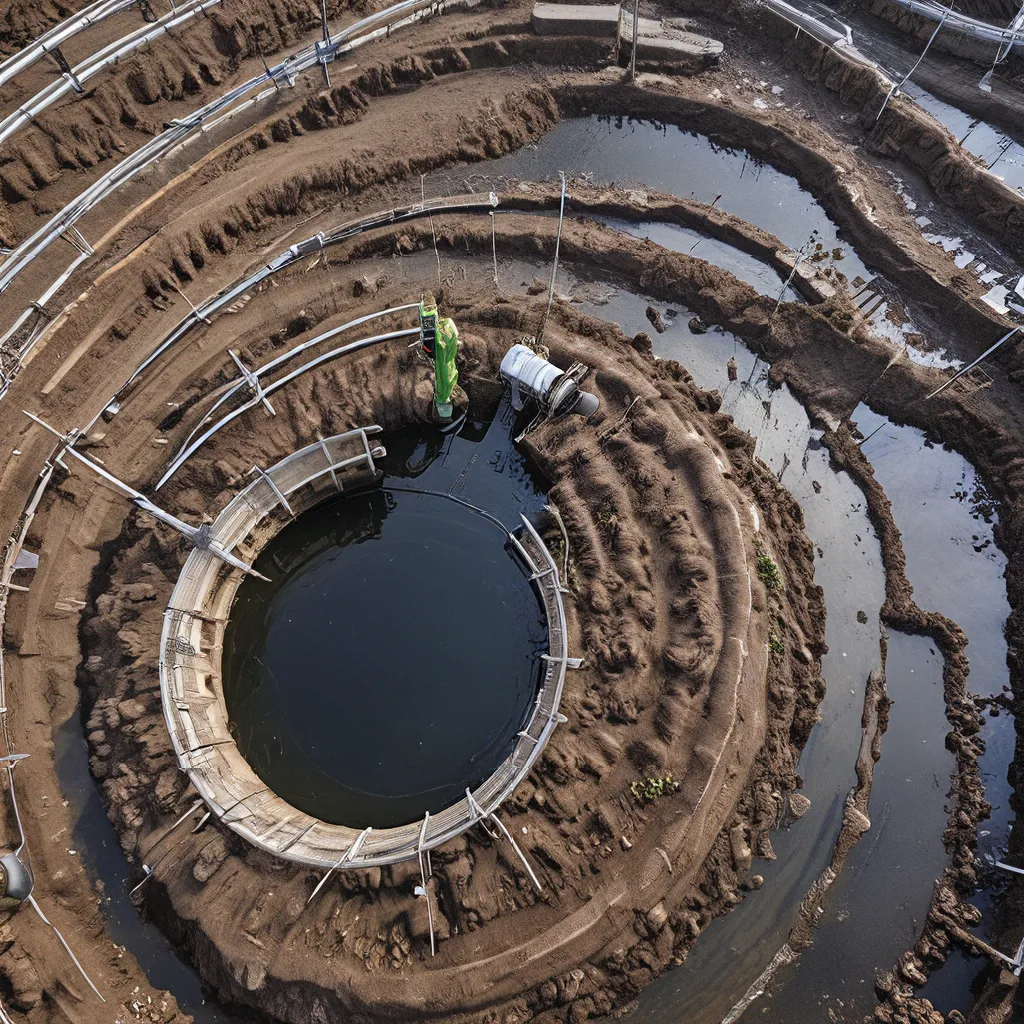
Ahh, the world of wastewater treatment – it’s a tangled web of pipes, filters, and a whole lot of that good ol’ H2O. But you know what they say, “One person’s waste is another’s treasure!” And that’s where the circular economy comes in, my friends.
Let me tell you, I used to think wastewater treatment was just about, well, treating the water and sending it on its merry way. But oh, how wrong I was. This industry is a veritable playground of innovation and sustainability. It’s all about unlocking the full value of those oh-so-precious waste streams and turning them into something truly remarkable.
Imagine a world where we don’t just treat the wastewater, but we valorize it – transforming it into valuable resources that can be reused and recycled. That’s the power of the circular economy, and let me tell you, it’s a game-changer.
Embracing the Circular Economy Approach
The circular economy is all about keeping resources in use for as long as possible, extracting the maximum value from them, and then recovering and regenerating products and materials at the end of their service life. It’s a far cry from the traditional linear economy, where we take, make, and dispose.
In the context of wastewater treatment, the circular economy approach is a game-changer. Instead of just treating the wastewater and sending it back into the world, we can valorize those waste streams, turning them into valuable resources that can be reused and recycled.
Think about it – the nutrients, the energy, the water itself – all of these elements can be recovered and reintegrated into the economic cycle. It’s a closed-loop system that minimizes waste, maximizes efficiency, and promotes sustainability.
Strategies for Implementing Circular Economy Practices
So, how do we make this circular economy magic happen in the world of wastewater treatment? Well, my friends, there are a few key strategies that can help us unlock the full value of those waste streams.
Short Circuits: This is all about maintaining and repairing products to preserve their integrity, minimize costs, and reduce embodied energy. It’s like that old saying, “If it ain’t broke, don’t fix it!” But in this case, it’s more like, “If it’s broke, let’s fix it!”
Long Circuits: This is where we maximize usage cycles and prolong the lifespan of resources and products. It’s about extending the life of those precious materials through biological and technological processes.
Cascading Loops: This is where we get creative and diversify the reuse of materials and components. It’s about taking that waste and transforming it into something new and valuable.
And let’s not forget about Pure Assets – that’s all about maintaining the quality of materials, enhancing collection efficiency, and reintegrating them into the economic cycle.
Putting it into Practice: Case Studies from Around the World
Now, let’s take a look at some real-world examples of how the circular economy is transforming the wastewater treatment industry.
In Brazil, the Ecozinha Institute is a nonprofit NGO that’s promoting sustainable community through responsible waste management. They’re separating and composting organic waste, recycling recyclables, and using logistics technology to track and audit the whole process. And get this, they’ve reduced more than 20,000 tons of greenhouse gases through their composting efforts!
Over in Togo, the ENPRO NGO is collecting and composting food waste and other municipal solid waste, producing more than 300 tons of compost annually. They’re also seeking new activities that benefit the environment and society, all while aiming for financial sustainability through diversification strategies and the sale of recyclable waste.
These are just a couple of examples, but the circular economy is taking the world by storm when it comes to wastewater treatment. NGOs, startups, and businesses alike are embracing the challenge, unlocking the value of those waste streams, and creating a more sustainable future for us all.
The Challenges and Opportunities Ahead
Of course, it’s not all sunshine and rainbows when it comes to implementing the circular economy in the wastewater treatment industry. There are challenges to overcome, like funding gaps, lack of recognition from society and policymakers, and the need for appropriate technology to collect and recover all that precious waste.
But you know what they say, “Where there’s a will, there’s a way!” And let me tell you, the opportunities are endless. From upcycling food waste into innovative products to collaborating with other stakeholders to create a more sustainable supply chain, the possibilities are truly exciting.
Embracing the Future: A Sustainable and Resilient Wastewater Treatment Industry
As we look to the future, I can’t help but feel optimistic about the potential of the circular economy to transform the wastewater treatment industry. By unlocking the full value of those waste streams and embracing integrated valorization and circular approaches, we can create a more sustainable, resilient, and efficient system that benefits us all.
So, my friends, let’s roll up our sleeves and dive in to this exciting world of wastewater treatment and the circular economy. Who knows what treasures we might uncover along the way? The future is ours to shape, and with a little creativity and innovation, I’m confident we can make it a bright one for both our planet and our communities.
Alpha Wastewater is leading the charge in this circular economy revolution, offering cutting-edge solutions and services to unlock the full potential of your wastewater treatment processes. So, what are you waiting for? Let’s embark on this journey together and create a more sustainable tomorrow!